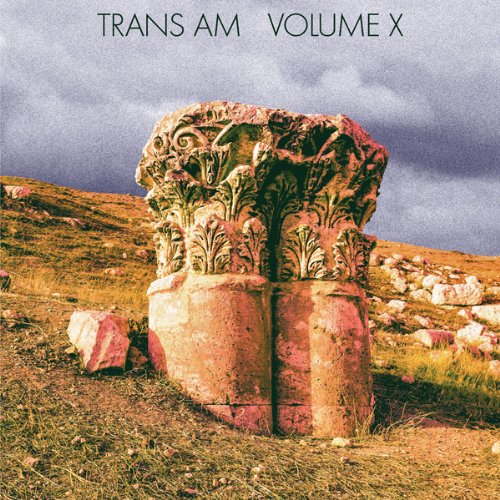
Trans Am
Volume X
Release Date: May 20, 2014
Genre(s): Pop/Rock, Alternative/Indie Rock, Indie Rock, Post-Rock, Experimental Rock
Record label: Thrill Jockey
Music Critic Score
How the Music Critic Score works
Buy Volume X from Amazon
Album Review: Volume X by Trans Am
Very Good, Based on 8 Critics
Based on rating 8/10
Trans Am have always been a beautiful enigma of a band. The sort of band that feel like a great big secret when you first discover them, and for good reason – they seem criminally unknown. Until fairly recently they were not even on Spotify, making sharing the joy of their existence pleasingly difficult. Volume X is their appropriately-titled tenth album and, although the press release talks about the title reflecting the physical volume of the music and the band's willingness to embody the mysterious and unknown, it also seems to suggest some kind of retrospective of their twenty-five year career.
Based on rating 3.5
Over the course of 20 years, Trans Am have diligently stuck to their task of producing constantly surprising and enthralling music. Volume X is, as the title suggests, their 10th album and serves as something of an encapsulation of what it is they do best. It’s a collection of songs that, whilst slightly incoherent as an album, nevertheless touches on every aspect of Trans Am’s oeuvre.
Based on rating 7/10
Over the years, Trans Am have been torch-bearers for many of the sounds that became fashionable again in 2010's indie rock and electronic music, including Krautrock, prog rock, electro, and stoner rock. On their aptly named tenth full-length, Volume X, they prove once again that they have more than enough sides to fill twice as many albums with engaging variations of their sound; The Red Line and Sex Change had as much musical breadth as several discographies' worth of music by less eclectic bands. While Volume X isn't as ambitious as either of those efforts, it shows why Trans Am's members work on projects as diverse as Baroness' omnivorous metal and the minimal Krautrock of Life Coach when they're not playing together.
Based on rating 7/10
This Maryland power trio, propelled by the drums of Sebastian Thomson (also of Baroness) and fronted by singer/bassist Nathan Means and guitarist-with-mystique Phil Manley, have been plugging away at their Krautrock-infatuated post-rock since 1990. Their obviously titled new album, Volume X, is their tenth studio album in that time, but considering that humble genius Manley spends a lot of time playing with the likes of Oneida, Jonas Reinhardt and his own Life Coach project, as well as recording dozens of respected albums at LCR Studios in San Francisco, their consistency over the years is remarkable. For all of their big name tie-ins and overwhelming skill, Trans Am have always made geek music for music geeks, and there ain't nothing wrong with that.
Based on rating 5.0/10
Nearly a quarter century has passed since the poker-faced, tongue-in-cheek trio of Trans Am began making post-rock on its own terms: synthesized, mysterious, and obsessed with classic-pop/rock kitsch. They’ve made great albums, as well as horrible albums, and sometimes it’s hard to tell which album fits in which category. They’ve remained fairly prolific, even if their music has continually shed whatever pertinence it had to the world of music at large—underground or otherwise—with the passage of time.
Opinion: Mediocre
The tenth LP by this Chicago three-piece, Volume X is either Trans Am’s major statement or a perfect example of talent run amok. Though known as one of American indie rock’s greatest #motorik# revivalists, the band prefers not to be boxed in, and spends this record’s 40 minutes proving that it can do something – anything – else. Thus the trio bounces from Kraftwerkian electro rock (“Ice Fortress”) to ebullient speed metal (“Backlash”) to doomy cosmic rock (“Anthroposcene”) to rawk disco (“Megastorm”) to some sort of approximation of Daft Punk (“Reevaluations,” “I’ll Never”).
Opinion: Excellent
Volume X is an album title which is both descriptive and prescriptive. It's the tenth album by Trans Am, but also the volume at which their expansive music is best played at. They've always defied description, and each album feels like a journey into stereophonic sound where they haven't bothered to lay a trail to find their way back. At times it's been menacing motorik like on Trans Am or Surrender To The Night, some have been ominously prophetic like Futureworld, while others have been enjoyably nihilistic like TA or Sex Change.
Opinion: Excellent
When Trans Am first emerged in 1995, it turned every club into an arena; and depending on your sensitivity to irony, you were either in the front row or the rafters. It was an experiment in pitting ironic distance against pummeling proximity: stripping the kitsch from analog synths, reclaiming butt-rock gestures, and daring to crash the indie-rock party with an actual party. Trans Am has proven more complex than most critical reductions would suggest, and its 10th album plays like a highlight reel of the band’s best facets.
'Volume X'
is available now

